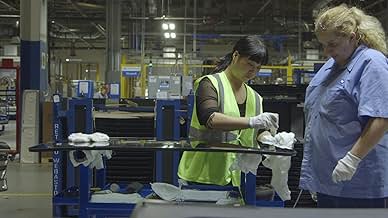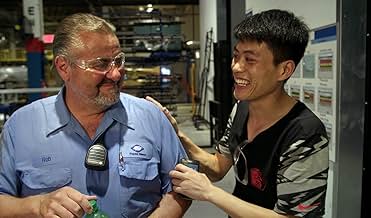CALIFICACIÓN DE IMDb
7.4/10
25 k
TU CALIFICACIÓN
Una fábrica cierra en Ohio en 2008. En 2014, un multimillonario chino la compra e invierte en producción de cristal para coches. Un retrato de las relaciones públicas entre Estados Unidos y ... Leer todoUna fábrica cierra en Ohio en 2008. En 2014, un multimillonario chino la compra e invierte en producción de cristal para coches. Un retrato de las relaciones públicas entre Estados Unidos y China.Una fábrica cierra en Ohio en 2008. En 2014, un multimillonario chino la compra e invierte en producción de cristal para coches. Un retrato de las relaciones públicas entre Estados Unidos y China.
- Ganó 1 premio Óscar
- 19 premios ganados y 50 nominaciones en total
Robert Allen
- Self - Furnace Off-Loader
- (as Bobby)
Opiniones destacadas
To be honest I can't believe they released this film... There are more than a few aspects that seem quite surreal and unbelievable.
I think for the most of the film you will be asking yourself a question where is all of this going, the answer is out there and it is quite broad.
One of the most shocking moments is the reveal of Chinese work culture. Workers are literally robots, they have numbers, they don't waste any time, they work 16 hours a day 26 days a month non stop.
In China, the corporation you work for is glorified to the point that you start to feel like you are part of a cult rather than a company that is simply making profit.
While it might be normal for China that there are small kids dancing, weddings happening and corporate bosses praised during one of the company celebrations, personally to me this looked surreal to the point of crazy.
For me the job is just a job, it's there because you need to make money, everything else is big bosses making big bucks off your back, nothing less nothing more, for chinese it's a cult.
Now I don't know if the goal of the globalization is to make everyone work like in China, but if it is, then everyone, literally everyone is in deep trouble, especially the biosphere of our planet ...
I think for the most of the film you will be asking yourself a question where is all of this going, the answer is out there and it is quite broad.
One of the most shocking moments is the reveal of Chinese work culture. Workers are literally robots, they have numbers, they don't waste any time, they work 16 hours a day 26 days a month non stop.
In China, the corporation you work for is glorified to the point that you start to feel like you are part of a cult rather than a company that is simply making profit.
While it might be normal for China that there are small kids dancing, weddings happening and corporate bosses praised during one of the company celebrations, personally to me this looked surreal to the point of crazy.
For me the job is just a job, it's there because you need to make money, everything else is big bosses making big bucks off your back, nothing less nothing more, for chinese it's a cult.
Now I don't know if the goal of the globalization is to make everyone work like in China, but if it is, then everyone, literally everyone is in deep trouble, especially the biosphere of our planet ...
I am a high school history teacher in the USA. I tried showing this movie to my classes, in between lessons on industrialization and the future of automation. This helped reveal the real problems we have, in my opinion. That most of my students were uninterested, and even did not care about these future issues. All they wanted to do was play games on their phones. I told them they would be quizzed on the material to try and get them to pay attention, but they did not care. Even when writing a quick summary of the movie, most just copied and pasted their responses, one of them even used one of these comments as their source data. They watched the movie with the strong belief that they won't end up like that. That somehow, they will be immune to these future issues.
For students who do not care about their education or their future, the best teacher in the world won't help. Apathy will destroy us far quicker than anything else.
For students who do not care about their education or their future, the best teacher in the world won't help. Apathy will destroy us far quicker than anything else.
Simply put, I'm blown away by this film. I'm a progressive, sure, but have grown disillusioned with Obama LONG ago, and I must say that I was reluctant at first to even give it a shot based on the fact that it was produced by the Obamas. After a recommendation from a friend, I decided to bite the bullet.
The result is that I'm kind of shattered. I have so many more factual questions, but learned so much, and was exposed to so many aspects of different cultures... (Should it matter, I'm a city-dwelling Canadian, for whom US policy is arguably as important as my own country's policies)... I'm also left with actual philosophical questions. Was any of it good? Was it bad? which parts? Chinese culture in their factories scared the crap out of me, but what does that mean? What does it mean about me, as well?
It took me 4 hours to watch this 1h50m documentary because I kept stopping to write down thoughts and ask random questions to close friends.
Not that it 'should' matter for a film that aims to inform, but the filming and DEFINITELY the soundtrack made the whole experience joyful in general. There's a lot to be said for an informative documentary that can keep people's attention, and this just became one of my favourites. I can recommend it without fear that people will just move on after 10 minutes. And I never felt that the documentary aspect was sacrificed.
Highly, highly recommend it.
This film is an extraordinary achievement. With footage going back over the years, the directors have pieced together the saga of the establishment of a Chinese-run industrial operation in Dayton on the site of a much-lamented closed GM plant, illustrating, with total objectivity, the contradictions that ensue from the imposition of one national worldview upon another in a dynamic that it never a clash of equals. The impatience and contempt of the Chinese investors toward their U.S. workforce and the consequent cultural conflicts are highlighted to devastating effect, illustrated by what American viewers will find to be an uncomfortable dissection of their own culture, in all its fatuous self-indulgence, by amazing footage of lectures on the subject by Chinese cross-cultural consultants as they lecture Chinese workers and supervisors sent to Dayton to show Americans in how things should be done.
At the Q&A at the premiere at IFC Center, co-director Julia Reichert was at pains to stress that the film was never meant to be polemical, that this was an effort to immerse and learn. While some of the silllier aspects of both cultures, (but especially the regimented and self-congratulatory aspects of the Chinese). come through with particular acuity, you can't help buy muse on how Americans have acted with equal tin-earedness and cultural arrogance around the world, over many more decades than the Chinese have been at this game.
At the same time, America's neediness of manufacturing jobs, even if they don't pay a living wage, and the ways that so many of what we would normally consider our core values go out the window to accommodate anyone who will invest in them, come through particularly clearly. This all comes together in a fight over the establishment of a union that would protect workers' rights and uphold our eroding safety and environmental standards that is the vivid core of the movie.
A final note: This film has an extraordinarily compelling musical score by someone names Chad Cannon that propels and highlights the narrative and is amazingly effective on its own terms. Although the idiom is different, Cannon's score does for this film much of what Philip Glass's have done over the years for the films of Errol Morris, and that is high praise indeed.
At the Q&A at the premiere at IFC Center, co-director Julia Reichert was at pains to stress that the film was never meant to be polemical, that this was an effort to immerse and learn. While some of the silllier aspects of both cultures, (but especially the regimented and self-congratulatory aspects of the Chinese). come through with particular acuity, you can't help buy muse on how Americans have acted with equal tin-earedness and cultural arrogance around the world, over many more decades than the Chinese have been at this game.
At the same time, America's neediness of manufacturing jobs, even if they don't pay a living wage, and the ways that so many of what we would normally consider our core values go out the window to accommodate anyone who will invest in them, come through particularly clearly. This all comes together in a fight over the establishment of a union that would protect workers' rights and uphold our eroding safety and environmental standards that is the vivid core of the movie.
A final note: This film has an extraordinarily compelling musical score by someone names Chad Cannon that propels and highlights the narrative and is amazingly effective on its own terms. Although the idiom is different, Cannon's score does for this film much of what Philip Glass's have done over the years for the films of Errol Morris, and that is high praise indeed.
I can't decide whether or not "American Factory" is hilarious or deeply depressing.
Hilarious because it's funny to see the culture clash between working class Americans and their Chinese counterparts (the Chinese CEO on a tour of his newly acquired American factory wants the fire alarm relocated because.....well, because it just looks bad). But depressing because it highlights the new global reality that many Americans just will not accept -- automation is eliminating entire sectors of workers around the world, and you can debate all day whether or not this is a good thing or a bad thing, but what's not up for update is that it's happening either way and those that can't adapt will be left behind.
This movie also reinforced something I've noted before, which is that if you take opposing ideologies to their furthest extremes, you eventually will meet in the same place. Conservative America is absolutely horrified at the slightest hint of socialism, let alone outright Communism, and tout capitalism as one of America's guiding principles. But the Chinese company in this film shows that capitalism taken to its monstrous extreme results in a culture that might as well exist in a Communist dictatorship, where allegiance to the company substitutes for allegiance to a political leader. And faced with that, what do working class Americans want? A dose of socialism to protect them from runaway corporate interests.
Grade: A-
Hilarious because it's funny to see the culture clash between working class Americans and their Chinese counterparts (the Chinese CEO on a tour of his newly acquired American factory wants the fire alarm relocated because.....well, because it just looks bad). But depressing because it highlights the new global reality that many Americans just will not accept -- automation is eliminating entire sectors of workers around the world, and you can debate all day whether or not this is a good thing or a bad thing, but what's not up for update is that it's happening either way and those that can't adapt will be left behind.
This movie also reinforced something I've noted before, which is that if you take opposing ideologies to their furthest extremes, you eventually will meet in the same place. Conservative America is absolutely horrified at the slightest hint of socialism, let alone outright Communism, and tout capitalism as one of America's guiding principles. But the Chinese company in this film shows that capitalism taken to its monstrous extreme results in a culture that might as well exist in a Communist dictatorship, where allegiance to the company substitutes for allegiance to a political leader. And faced with that, what do working class Americans want? A dose of socialism to protect them from runaway corporate interests.
Grade: A-
¿Sabías que…?
- TriviaDirectors Steven Bognar and Julia Reichert previously worked on the short documentary The Last Truck: Closing of a GM Plant (2009). It is about how the plant was shut down by General Motors, a topic in this movie.
- Citas
Himself - Fuyao Safety Director: Everybody at every level will say that we really, really want to be safe. But safety doesn't pay the bills.
- ConexionesFeatured in The Oscars (2020)
Selecciones populares
Inicia sesión para calificar y agrega a la lista de videos para obtener recomendaciones personalizadas
- How long is American Factory?Con tecnología de Alexa
Detalles
- Fecha de lanzamiento
- País de origen
- Sitio oficial
- Idiomas
- También se conoce como
- American Factory
- Locaciones de filmación
- Productoras
- Ver más créditos de la compañía en IMDbPro
- Tiempo de ejecución1 hora 50 minutos
- Color
- Mezcla de sonido
- Relación de aspecto
- 1.78 : 1
- 1.85 : 1
Contribuir a esta página
Sugiere una edición o agrega el contenido que falta

Principales brechas de datos
What is the Japanese language plot outline for Fábrica americana (2019)?
Responda































